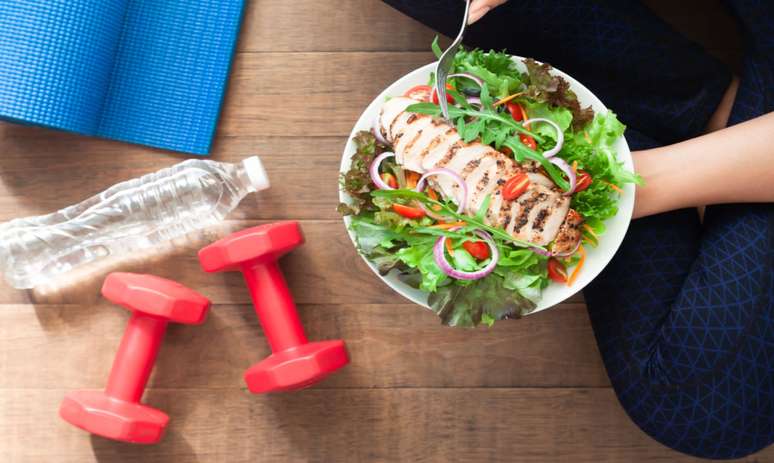The nutritionist explains how proper nutrition can improve performance in physical exercises and sports
For those who practice physical exercises, whether it’s bodybuilding or any sport, food is an excellent ally. By blending the two, it is possible to arrive at the best version of yourself when it comes to quality of life. But in addition, the regular practice of sport, in line with the intake of good nutrition, offers yet other health benefits.

Benefits of a good diet combined with sport
According to Liz Galvão, partner nutritionist of Verde Campo, combining good nutrition with physical activity helps reduce the incidence and development of chronic diseases. This is the case with diabetes, hypertension, cardiovascular disease, cancer and obesity. In addition, it also improves sleep quality, increases disposition, regulates bowel functioning, aids mental health, stimulates mobility and longevity, and much more.
“Practicing physical activity from infancy to old age is essential. There is no ideal exercise, so individuality, desire, pleasure and fitness must be respected. As for nutrition, it should be based on ‘intake of multiple food groups,’ Liz points out. The expert’s advice is to opt for colorful and varied dishes divided into four to six daily meals. Each food group provides essential nutrients to maintain life, store nutrients in our bodies, and provide fuel for basic activities and sports.
In addition to the benefits of the combination, the food can improve sports performance. This is because it improves adaptive response. That is, you can adapt to exercise much better when your diet is aligned with your practice and your goals. It also reduces the risk of injury and muscle pain, stimulates muscle recovery; improves sleep quality and as a result, when you sleep better, you can train more efficiently.
But it doesn’t end there. According to the nutritionist, maintaining an adequate diet also increases disposition and well-being, which is a motivation for training, helps to reduce body weight (which can hinder the practice of physical activity, as well as overloading joints and bones) and increases strength and muscle mass, stimulating hypertrophy.
the carbohydrates
There are several ways to execute these strategies on a daily basis, Liz points out. Carbohydrates, for example, are a nutrient that quickly supplies the body with energy and their consumption can be a stimulus for the practice of physical activity.
“On the other hand, inadequate carbohydrate consumption can cause hypoglycemia, decreased performance and muscle mass due to impaired muscle contraction processes due to lack of energy and premature muscle fatigue,” warns the professional.
Simple carbohydrates, found in fruit, are great pre-workout options for those who want quick energy, as they are absorbed faster by the body. Examples are: natural orange juice, whole and natural grape juice, honey, banana, dried fruits such as prunes, dates and apricots, among others.
Options to include in food
“If you want short-to-medium-term energy, you can add servings of oats, yogurt, cheese, nuts, seeds, granola, peanut butter, cocoa and 70% chocolate to fruit, as well as some tubers like potatoes and cassava. In addition , thermogenic foods help in the production of energy, as they naturally stimulate the metabolism, such as coffee, green tea, cinnamon, pepper, ginger and coconut oil”, advises the nutritionist.
Beetroot is a great pre-workout option, as it is a source of nitrates, which are converted into nitric oxide by the body, which promotes vasodilation. This circulates more oxygen-rich blood through the body and reaches the muscles. “This way you can train harder, for longer, without fatigue. In addition, beetroot is also an anti-inflammatory and antioxidant food, which aids muscle recovery. You can use it in juice in its raw form, powdered or even as a supplement, under the guidance of a nutritionist,” Liz indicates.
Proteins, on the other hand, play an important role in anabolic processes, providing the necessary and essential amino acids for the construction and maintenance of tissues. Therefore, they are extremely important in the formation, repair and recovery of muscle mass. “You can consume meat, eggs, yogurt and protein shakes; supplements such as whey protein or plant protein and legumes, oilseeds and seeds such as peanuts, beans, tofu (which is a derivative of soy), seeds pumpkin, flaxseed, chia, chestnuts and more,” quotes the nutritionist.
Consuming these protein sources doesn’t have to happen immediately post-workout, she points out. By the way, an hour or two after training is an adequate time for this. “But it is important to underline that, in order to have a better result, the consumption of proteins must be divided evenly into all the meals of the day”, he points out.
where to start
The practitioner also remembers that every person and every body is unique. Therefore, there is no universal type of food and type of exercise that fits all. “We must respect goals, individual characteristics, limits, preferences, physical and mental conditions, to seek a possible and adequate nutritional approach to that period / goal., He reiterates.
Source: Terra
Ben Stock is a lifestyle journalist and author at Gossipify. He writes about topics such as health, wellness, travel, food and home decor. He provides practical advice and inspiration to improve well-being, keeps readers up to date with latest lifestyle news and trends, known for his engaging writing style, in-depth analysis and unique perspectives.







